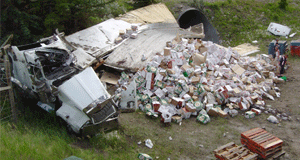
Truck crash in Alberta
Frank Touby —
We are paying with our bodies and our lives for transnational corporations to improve their returns on investment. It’s an outrage that governments can and must be forced to end.
The deadly practice known as “just-in-time” (or JIT) delivery is a scandal of immense proportions that’s enabled by governments that are servile to corporations at the expense of the public they are elected to serve.
It works like this:
A retailer such as Walmart doesn’t want to spend an extra nickel on anything, including space that’s used to store merchandise the corporation sells. So Walmart and other outfits demand that the very trucks that deliver the merchandise to their stores serve as the warehouse while the items are on the road to the retail stores. No storage or warehouse fees for the retailer; no such jobs either. It’s all good … for the retailers.
The ideal is that just as the stores are selling out of merchandise, a new batch is being loaded onto their docks. Perfect for the stores. But a nightmare both for the drivers and for the public who are involved in the tens of thousands of annual crashes in North America resulting from such hurry-up-or-miss-the-loading-dock time windows. That can cost a driver a day’s pay waiting for a new time window to open on the loading dock for his or her loaded-down truck, and perhaps other penalties in the form of lost time “incentives.”
Stressed-out truckers are a hazard on the highways and JIT is behind most such wrecks. Yet it’s beneath the radar of the government officials who should be legislating against these ongoing atrocities.
Truck-against-car crashes are almost always catastrophic and frequently fatal. The savings to corporations are in flesh and blood against the public.
“Every year in the United States, there are over 400,000 collisions involving heavy trucks, and more than 100,000 people are injured, a third of them suffer catastrophic, life-changing injuries, and over 5,000 die in these crashes. Every year over 100,000 are injured, one-third of those life-altering injuries.”
Those numbers come from U.S.-based Ross Law Group that specializes in such matters. Canadian numbers are likely around a tenth of that, but nonetheless outrageously high.
Canada can and must prevent this sort of “rolling warehouse” mentality that exhausts and stresses truckers and puts our highway traffic at peril. As noxious free-trade deals threaten the livelihoods of Canadian workers, especially if a North-American rapid highway route from Mexico to Canada is built, a sensible solution to make things safer and more competitive is at hand
Here is a way for Canada to make our highways infinitely safer, create more jobs and increase retail competition. It should catch on south of the border as well, but whether it does or not, it’s the right solution for us.
Placing a prohibition on JIT isn’t necessary. Make it impossible to predict just when a load can be delivered by a tractor-trailer or a cube van. Make the fines significant to prevent breaches of speed and travel rules.
1. Restrict all delivery vehicles ranging in size from cube van to tractor-trailer to a maximum 55 miles per hour (90 km/h). Make exceeding that speed limit so costly that a trucker won’t dare breach it. A good way is to set as a fine a dollar figure for the weight of the vehicle multiplied by the numbers of miles/kilometres per hour over the limit.
2. Restrict delivery vehicles to the right-hand lane and four truck lengths apart. This enables smaller vehicles to manoeuvre without jeopardizing life and limb against a huge truck.
3. Prohibit delivery vehicles from passing other vehicles on the highway. This prevents a practice among many drivers to pass other vehicles to alleviate boredom.
4. Restrict the numbers of hours a driver may be on the road and enforce that both with effective surveillance and significant fines.
5. Restrict to one the number of drivers in the vehicle during a shift.
There will be several beneficial effects from these moves.
• The driving public will exponentially safer with vastly fewer truck/car collisions.
• More drivers will be needed, therefore more jobs are provided.
• More warehouses will be needed, therefore still more jobs are provided.
• Smaller retailers will be better able to compete against the giants and that benefits the economy in numerous ways, including provision of more jobs.
• Prices will likely be little affected at retail. Corporate profits will be diminished, but smaller corporations will have more opportunities and be better able to compete without growing to massive size and endangering the public with JIT threats.
 TheBulletin.ca Journal of Downtown Toronto
TheBulletin.ca Journal of Downtown Toronto

